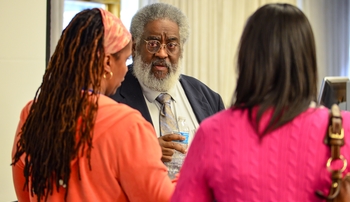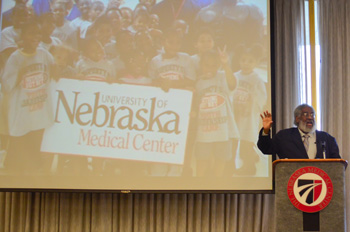 |
Ira Combs at Monday’s annual Martin Luther King Jr. event. |
Ira Combs, community liaison nurse coordinator for the Center for Reducing Health Disparities at UNMC’s College of Public Health, spoke at the annual luncheon sponsored by UNMC and The Nebraska Medical Center.
Combs serves as a liaison with the African-American community, develops relationships and facilitates health care services aimed at screening and interventions for minority and underserved populations.
His speech, titled “King, Health Care and his Letter from the Birmingham Jail,” began with a slide show to introduce himself – his great-grandfathers were slave owners – and a brief recap of the civil rights movement with Sam Cooke singing, “A Change is Gonna Come.”
Change has come, Combs said, but major inequalities still exist.
 After King was arrested in Birmingham on a Good Friday, eight prominent white clergy men wrote a letter titled “Call to Unity.” The clergymen agreed that social injustices existed but argued that the battle against racial segregation should be fought in the courts, not the streets.
After King was arrested in Birmingham on a Good Friday, eight prominent white clergy men wrote a letter titled “Call to Unity.” The clergymen agreed that social injustices existed but argued that the battle against racial segregation should be fought in the courts, not the streets.
King responded by writing “A Letter from Birmingham Jail” in the margins of the very newspaper the clergy’s letter had been printed as he was not allowed writing paper in his cell.
Referring to his belief that all communities and states were interrelated, King wrote, “Injustice anywhere is a threat to justice everywhere. We are caught in an inescapable network of mutuality, tied in a single garment of destiny. Whatever affects one directly, affects all indirectly.”
King also said there is no greater inequality than inequality in health care, Combs said. “We have a medical desert in North Omaha. People who have no insurance and no money have to travel to other parts of the city to get care.”
While there are admirable programs in the community, more are needed, said Combs, who recently received the White House “Champion of Change Award” and the Martin Luther King Award from Life Care Center of Omaha for his work in health prevention and education.
Combs then cited individuals, groups and organizations who would win his “Champion of Change” award. “These are people already doing things in the community, who are instruments of change who come together and provide services that make a difference.
“You can do that too.”